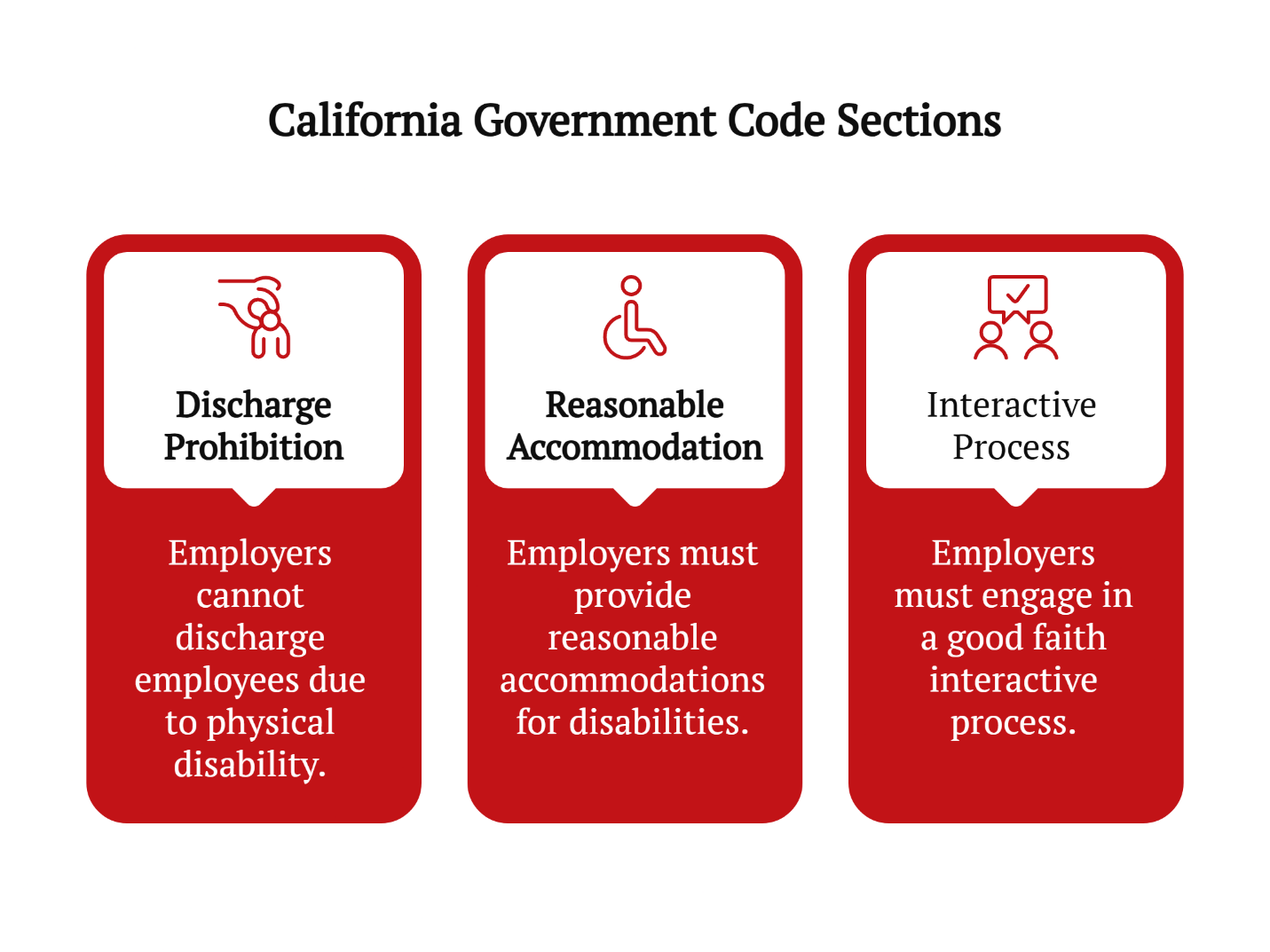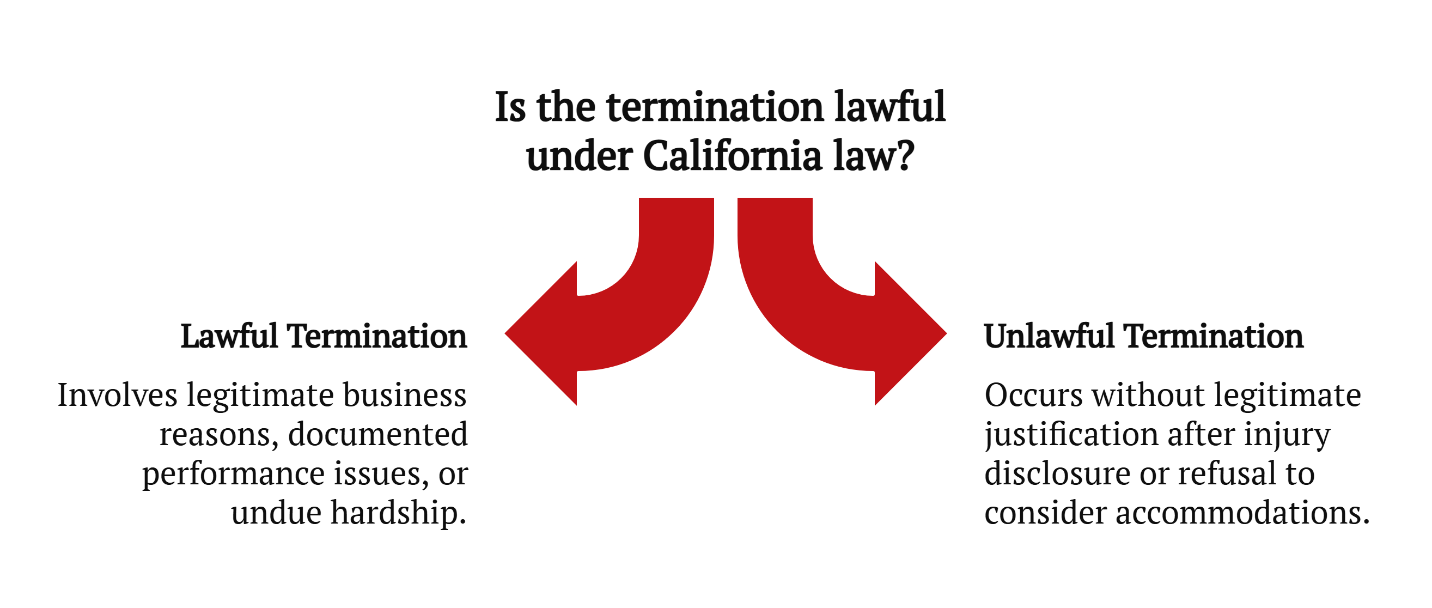📌 Key Takeaways
Facing termination after a back injury demands clarity on what is lawful and what may violate California’s protections.
Recognize Statutory Red Flags: Termination tied closely to a back injury disclosure may violate FEHA provisions prohibiting disability-based discharge, failure to accommodate, or refusal to engage in the interactive process.
Distinguish Legitimate from Illegal Termination: A lawful discharge is supported by documented, pre-existing performance issues or proven undue hardship, not sudden adverse actions post-injury disclosure.
Spot Interactive Process Failures: Ignoring accommodation requests, refusing discussions, or rejecting alternatives without undue hardship justification can breach California Code of Regulations § 11068.
Identify Improper Accommodation Denials: Blanket rejections without individualized assessment or failure to consider reassignment to a vacant position can violate Government Code § 12926(p).
Act Within Legal Timeframes: Deadlines for taking action can be short, making early consultation with a qualified employment attorney critical.
Clear statutory alignment and prompt legal guidance protect your rights after a back injury.
Employment laws are subject to change and may have exceptions. Excerpts provided below are current as of 2025. Consultation with a qualified employment law attorney is essential for case-specific guidance.
1. Identifying Concrete FEHA Violations in Back Injury Cases

Indicators of Potential Violation:
- Termination soon after disclosing a back injury.
- Documented refusal by the employer to engage in the interactive process.
- Written denial of reasonable accommodation requests.
- Sudden, negative performance reviews post-disclosure.
Relevant Statutory Language:
California Government Code § 12940(a):
“It is an unlawful employment practice… [f]or an employer, because of the… physical disability… of any person, to… discharge the person from employment.”
California Government Code § 12940(k):
“It is an unlawful employment practice… [f]or an employer… to fail to make reasonable accommodation for the known physical… disability of an applicant or employee.”
California Government Code § 12940(m):
“It is an unlawful employment practice… [f]or an employer… to fail to engage in a timely, good faith, interactive process with the employee… to determine effective reasonable accommodations.”
2. Distinguishing Lawful from Unlawful Termination Under California Law

Lawful Terminations May Involve:
- Legitimate business reasons unrelated to disability.
- Documented performance issues predating injury disclosure.
- Demonstrated undue hardship consistent with statutory standards.
Potentially Unlawful Terminations May Involve:
- Adverse employment action closely following back injury disclosure without legitimate, documented justification.
- Refusal to consider accommodations before termination.
3. Recognizing Interactive Process Failures
Indicators:
- Employer ignores written accommodation requests.
- Employer refuses to discuss possible adjustments.
- Alternative accommodation suggestions dismissed without analysis of hardship.
Relevant Statutory Language:
California Code of Regulations, Title 2, § 11068(a):
“It is unlawful for an employer… to fail to engage in a timely, good faith, interactive process with the employee… to determine effective reasonable accommodations.”
4. Common Patterns in Reasonable Accommodation Denials
Indicators:
- Blanket denials without individualized assessment.
- Employer fails to evaluate possible job restructuring.
- No effort to explore reassignment to a vacant position.
Relevant Statutory Language:
California Government Code § 12926(p):
“‘Reasonable accommodation’ may include… job restructuring, part-time or modified work schedules, reassignment to a vacant position, acquisition or modification of equipment or devices… and other similar accommodations for individuals with disabilities.”
5. Resources for Professional Guidance
- California Civil Rights Department (CRD) (formerly DFEH) – Official guidance and complaint intake.
- California State Bar Attorney Referral Service – Connection to qualified employment law attorneys.
- Nonprofit legal aid organizations assisting eligible workers.
6. Professional Consultation Reminder
Every case depends on its unique facts. Identifying statutory language is only the first step. A qualified employment law attorney can evaluate whether the circumstances meet legal thresholds for a claim under FEHA and related regulations.
Disclaimer:
This content is for informational purposes only. This content is not legal advice. No attorney-client relationship is formed through this content. Please consult a qualified attorney in your jurisdiction for legal advice specific to your situation.
Protect Your Rights | The Akopyan Law Firm, A.P.C. | Top Gun Employment Lawyers
Have you been wrongfully terminated from your job? Have you suffered discrimination, harassment, or retaliation in the workplace? Has your employer violated wage and hour laws? If so, we can help. The Akopyan Law Firm, A.P.C. is dedicated to protecting and enforcing employees’ rights throughout Southern California. With a 97% success rate and millions recovered for our clients, our team of experienced and talented employment lawyers can fight to secure the justice you deserve.
Take the First Step Towards Securing Justice: Call us today to speak with one of our experienced employment lawyers. The firm offers case evaluations free of charge.
Contact Us Today:
- Phone: (818) 509-9975
- Office Locations: Los Angeles, Bakersfield, Costa Mesa, Temecula, Rancho Cucamonga, Oxnard, Culver City, and San Diego in California.
Important: Contacting the Akopyan Law Firm, A.P.C. does not create an attorney-client relationship, but all communications will remain private and confidential. Each case is unique. The Akopyan Law Firm, A.P.C., does not guarantee any outcome.

